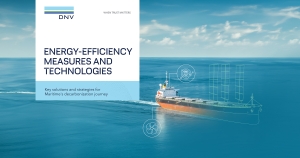


(Posted on 06/03/25)
With increasing regulatory pressure and rising fuel costs, the shipping industry must accelerate decarbonization while ensuring operational and economic viability. Energy-efficiency measures can play a crucial role in reducing fuel consumption and facilitating the transition to alternative fuels as they become available. To help shipowners identify the best solutions for their fleet, DNV has published a report offering a comprehensive overview of currently available energy-efficiency measures and technologies.
DNV’s latest report, Energy-efficiency measures and technologies – Key solutions and strategies for Maritime’s decarbonization journey, provides a comprehensive overview of more than 40 energy-efficiency measures, detailing their fuel-saving effects, cost figures, and suitability for specific ship types. It highlights how these measures can help shipowners meet short- and mid-term regulatory requirements, gain a competitive edge, and ensure profitable operations well into the 2030s and 2040s.
Knut Ørbeck-Nilssen, CEO at DNV Maritime, said: “The decarbonization of shipping is one of our greatest challenges. While transitioning to carbon-neutral fuels is essential, supply and cost remain key barriers. To accelerate this shift, all possible measures must be explored. Energy-efficiency measures can not only cut emissions in the short term but also support the adoption of alternative fuels by reducing overall fuel demand and operational costs. With many such measures available, our report aims to help stakeholders navigate these choices and identify the best solutions for their fleets.”
In the report, DNV explores a wide range of technical and operational measures, detailing cost considerations, suitability for different ship types, and the challenges of combining multiple solutions effectively. Digitalization also plays an important role, and the report offers insights into how data-driven decision-making can enhance fuel savings, while ensuring cybersecurity remains a priority.
DNV’s report outlines a three-step approach for managing decarbonization risks: defining greenhouse gas (GHG) trajectory and goals, assessing pathways for meeting these goals, and developing a fleet decarbonization strategy and plan. It also explores other solutions such as low-carbon and carbon-neutral fuels, biofuels, onboard carbon capture, fuel cells, and nuclear propulsion, evaluating their benefits, challenges, and emissions reduction potential.
Jason Stefanatos, Global Decarbonization Director at DNV Maritime added: “Energy efficiency is key to reducing emissions and enabling low-carbon fuel adoption. While there’s no one-size-fits-all solution, improving onboard efficiency reduces emissions in the short term and accelerates low-carbon fuel adoption in the long term. Every percentage of fuel saved, whether conventional or alternative, translates into significant cost savings. Energy efficiency is becoming critical, and the industry must raise awareness, gain knowledge, and plan ahead.”
Inchcape Shipping Services (ISS), a global leader in port agency and marine services, has announced... Read more
NORDEN have confirm that they have sold two vessels from their owned fleet, one Capesize vessel and... Read more
Pacific Basin Shipping Limited, one of the world’s leading dry bulk shipping companies, has entered... Read more
AtoB@C Shipping, a subsidiary of ESL Shipping, has announced the successful delivery of Fleximar, the... Read more
Western Bulk, together with reputable Norwegian partners A/S J. Ludwig Mowinckels Rederi, Premium Maritime... Read more
Pacific Basin Shipping Limited, one of the world’s leading dry bulk shipping companies, has announced... Read more
Columbia Group anticipates a period of strong expansion as an increasing number of international shipowners... Read more
Norse?Ship Management has expanded its use of Smart Ship Hub’s high frequency sensor data and... Read more
As the maritime industry gears up to welcome the IMO’s STCW bullying and harassment training amendments... Read more
NORDEN has acquired the cargo activities of Taylor Maritime in Southern Africa (previously operated... Read more